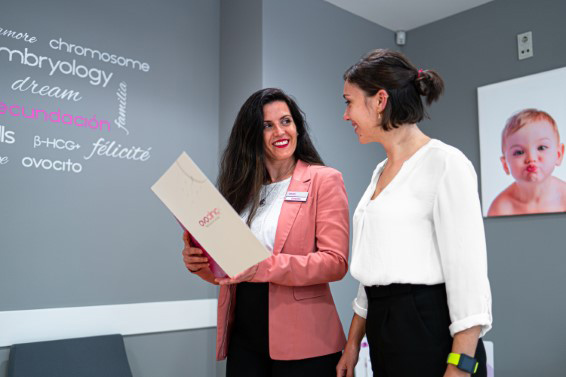… At Ovoclinic we answer all your questions and advise you on the most suitable treatment for achieving your pregnancy, giving you all the human, medical and psychological support you need during the whole process.
We understand sterility to be the impossibility for a couple to achieve a pregnancy by natural means after having normal sexual relations for more than a year.
In Spain alone there are some 600,000 couples of reproductive age with problems in having children. According to the European Fertility Institute, every year 16,000 new couples in our country have difficulties in achieving a pregnancy and need to go to a centre specialised in assisted reproduction, such as Ovoclinic.
Also, in the last five years, the number of women who decide to face their maternity without a male partner and who need the help of a reproduction specialist has multiplied by four.
WHEN TO CONSULT WITH A SPECIALIST?
In those cases where the woman is under 35, it is advisable that she sees a specialist if after 12 months of trying to conceive pregnancy has not been achieved. If the woman is over 35, it is advisable that basic investigations are carried out if pregnancy has not been achieved after six months.
It is also advisable after a period of six months in cases, regardless of age, in which there are previous risk factors, such as endometriosis, polycystic ovary syndrome, previous gynaecological surgery, spontaneous miscarriage…
In the male partner’s case, consultation is advisable if they have not achieved pregnancy after one year of normal intercourse, or in six months in cases of previous genital surgery, mumps in childhood, erectile difficulties and also in cases of concomitant pathologies such as obesity, hypertension or diabetes.
FERTILITY STUDIES

In women, the investigation would include an TV ultrasound to evaluate the ovarian reserve (the number of antral follicles that the ovaries have) and the uterine cavity, ruling out uterine malformation or pathologies such as fibroids, adenomyosis or polyps. Normally a blood test for anti-Mullerian hormone (AMH) is also requested to complete the information about the ovarian reserve.
One of the most important parameters in the evaluation of ovarian reserve is age, since there is an inversely proportional relationship between the age of the patient and the number and quality of her eggs.
In the male partner, the investigations would include a semen analysis to assess motility, morphology and sperm count. This test requires two to three days of sexual abstinence and the sample must be collected by masturbation in the sterile conditions indicated.
Sometimes, given certain background in the patient’s history or after a failed ART cycle, more in-depth investigation may be needed, amongst which the following could be requested:
- Hysteroscopy
- High resolution ultrasound
- Thrombophilia screening
- Immune investigations
- endometrial receptivity testing
- Endometrial micro biota testing
- Chronic endometritis testing
Having a normal semen analysis in terms of quantity, morphology and motility does not guarantee that sperm are fertile, sometimes more in-depth investigations may be needed such as:
- Sperm FISH analysis
- Halosperm
- COMET Assay to check single and double strand fragmentation
Repeated miscarriages and implantation failure
Alterations in the embryo are the cause of more than 50% of cases of miscarriage and implantation failure. Transferring chromosomally normal embryos significantly increases pregnancy rates, regardless of age, and dramatically reduces the possibility of miscarriage.
When evaluating patients presenting these conditions, it is important to try to obtain as much information as possible about both the egg and the sperm, since both contribute to the chromosomal load of the embryo.
However, there are other causes that can directly affect the mother and cause these miscarriages or implantation failures. The first investigations to be carried out would be an in-depth evaluation of the uterus and endometrium and specific tests to rule out blood clotting alterations . In more complex cases we may need to resort to immunological investigations or more advanced endometrial testing.
At Ovoclinic we offer comprehensive investigations of these complex cases, reaching in the vast majority of cases an appropriate diagnosis and treatment.
PSYCHOLOGICAL ASSESSMENT
Anxious, frustrated, or especially expectant. These adjectives could reflect how the majority of couples attending a fertility clinic feel. Difficulty in conceiving is an unexpected situation that can lead to a multitude of reactions, each of which will require different needs. That is why, from the outset, psychological assessment is essential allowing us to be aware of the emotional situation from the start, the implications that the assimilation of the problem, the treatment itself or even the outcome may entail.
By using different assessment techniques, we can get a clear view of both the initial emotional state and personal and social resources of both partners, aspects that will be paramount in the planning of intervention and / or appropriate psychological support for each case.
Likewise, it is a first contact where an environment of acceptance, security and trust is created, since a very important point of treatment is to have a space where you can express emotions, concerns, develop coping strategies and solve all kinds of doubts. That is, having constant support and advice throughout the entire process.



